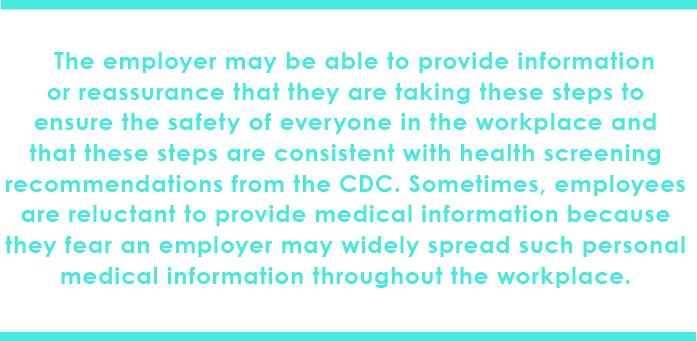By Colleen M. McCarthy, Ferruzo & Ferruzo
Last week the U.S. Equal Employment Opportunity Commission (EEOC) issued further guidance to employers on what can be asked of employees during the pandemic. Caught between trying to make the worksite a safe place while not making inquiries that might violate the law, employers have to tread carefully. The EEOC has clarified that employers can go further during the pandemic to protect the health and safety of their employees. Below is an excerpt from recent guidance offered by the EEOC to help employers continue to navigate the balance between employee safety and privacy.
A.8. May employers ask all employees physically entering the workplace if they have been diagnosed with or tested for COVID-19?
Yes. Employers may ask all employees who will be physically entering the workplace if they have COVID-19 or symptoms associated with COVID-19, and ask if they have been tested for COVID-19. An employer may exclude those with COVID-19, or symptoms associated with COVID-19, from the workplace because, as EEOC has stated, their presence would pose a direct threat to the health or safety of others. However, for those employees who are teleworking and are not physically interacting with coworkers or others (for example, customers), the employer would generally not be permitted to ask these questions.
A.9. May a manager ask only one employee — as opposed to asking all employees — questions designed to determine if they have COVID-19, or require that this employee alone have their temperature taken or undergo other screening
or testing?
If an employer wishes to ask only a particular employee to answer such questions or to have her temperature taken or undergo other screening or testing, the ADA requires the employer to have a reasonable belief based on objective evidence that this person might have the disease. So, the employer needs to consider why it wishes to take these actions regarding this particular employee, such as displaying COVID-19 symptoms. In addition, the ADA does not interfere with employers following recommendations by the CDC or other public health authorities regarding whether, when, and for whom testing or additional screening is appropriate.

A.10. May an employer ask an employee who is physically coming into the workplace whether they have family members who have COVID-19 or symptoms associated with COVID-19?
No. The Genetic Information Nondiscrimination Act (GINA) prohibits employers from asking employees medical questions about family members. GINA, however, does not prohibit an employer from asking employees whether they have had contact with anyone diagnosed with COVID-19 or who may have symptoms associated with the disease. Moreover, from a public health perspective, only asking an employee about their contact with family members would unnecessarily limit the information obtained about an employee’s potential exposure to COVID-19.
A.11. What may an employer do under the ADA if an employee refuses to permit the employer to take his temperature or refuses to answer questions about whether he has COVID-19, has symptoms associated with COVID-19, or has been tested for COVID-19?
Under the circumstances existing currently, the ADA allows an employer to bar an employee from physical presence in the workplace if he refuses to have his temperature taken or refuses to answer questions about whether he has COVID-19, has symptoms associated with COVID-19, or has been tested for COVID-19. To gain the cooperation of employees, however, employers may wish to ask the reasons for the employee’s refusal. The employer may be able to provide information or reassurance that they are taking these steps to ensure the safety of everyone in the workplace and that these steps are consistent with health screening recommendations from the CDC. Sometimes, employees are reluctant to provide medical information because they fear an employer may widely spread such personal medical information throughout the workplace. The ADA prohibits such broad disclosures. Alternatively, if an employee requests reasonable accommodation with respect to screening, the usual accommodation process should be followed.
A.12. During the COVID-19 pandemic, may an employer request information from employees who work on-site, whether regularly or occasionally, who report feeling ill or call in sick?
Due to the COVID-19 pandemic, at this time, employers may ask employees who work on-site, whether regularly or occasionally, and report feeling ill or call in sick, questions about their symptoms as part of workplace screening for COVID-19.
A.13. May an employer ask an employee why he or she has been absent from work?
Yes. Asking why an individual did not report to work is not a disability-related inquiry. An employer is always entitled to know why an employee has not reported for work.

A.14. When an employee returns from travel during a pandemic, must an employer wait until the employee develops COVID-19 symptoms to ask questions about where they have traveled?
No. Questions about where a person traveled would not be disability-related inquiries. If the CDC or state or local public health officials recommend that people who visit specified locations remain at home for a certain period, an employer may ask whether employees are returning from these locations, even if the travel was personal.
B.7. An employer knows that an employee is teleworking because the person has COVID-19 or symptoms associated with the disease and that he is in self-quarantine. May the employer tell staff that this particular employee is teleworking without saying why?
Yes. If staff need to know how to contact the employee and that the employee is working even if not present in the workplace, then disclosure that the employee is teleworking without saying why is permissible. If the employee was on leave rather than teleworking because he has COVID-19 or symptoms associated with the disease or any other medical condition, then an employer cannot disclose the reason for the leave, just the fact that the individual is on leave.
D.14. When an employer requires some or all of its employees to telework because of COVID-19 or government officials require employers to shut down their facilities and have workers telework, is the employer required to provide a teleworking employee with the same reasonable accommodations for disability under the ADA or the Rehabilitation Act that it provides to this individual in the workplace?
If such a request is made, the employer and employee should discuss what the employee needs and why, and whether the same or a different accommodation could suffice in the home setting. For example, an employee may already have certain things in their home to enable them to do their job so that they do not need to have all of the accommodations that are provided in the workplace.
Also, the undue hardship considerations might be different when evaluating a request for accommodation when teleworking rather than working in the workplace. A reasonable accommodation that is feasible and does not pose an undue hardship in the workplace might pose one when considering circumstances, such as the place where it is needed and the reason for telework. For example, the fact that the period of telework may be of a temporary or unknown duration may render certain accommodations either not feasible or an undue hardship. There may also be constraints on the normal availability of items or on the ability of an employer to conduct a necessary assessment.
As a practical matter, and in light of the circumstances that led to the need for telework, employers and employees should both be creative and flexible about what can be done when an employee needs a reasonable accommodation for telework at home. If possible, providing interim accommodations might be appropriate while an employer discusses a request with the employee or is waiting for additional information.
D.15. Assume that an employer grants telework to employees to slow or stop the spread of COVID-19. When an employer reopens the workplace and recalls employees to the worksite, does the employer automatically have to grant telework as a reasonable accommodation to every employee with a disability who requests to continue this arrangement as an ADA/Rehabilitation Act accommodation?
No. If an employee requests a reasonable accommodation, the employer is entitled to understand the disability-related limitation that necessitates an accommodation. If there is no disability-related limitation that requires teleworking, then the employer does not have to provide telework as an accommodation. Or, if there is a disability-related limitation, but the employer can effectively address the need with another form of reasonable accommodation at the workplace, the employer can choose that alternative to telework.
To the extent that an employer is permitting telework to employees because of COVID-19 and is choosing to excuse an employee from performing one or more essential functions, then a request — after the workplace reopens — to continue telework as a reasonable accommodation does not have to be granted if it requires continuing to excuse the employee from performing an essential function. The ADA never requires an employer to eliminate an essential function as an accommodation for an individual with a disability.
The fact that an employer temporarily excused performance of one or more essential functions when it closed the workplace and enabled employees to telework to protect their safety from COVID-19, or otherwise chose to permit telework, does not mean that the employer permanently changed a job’s essential functions, that telework is always a feasible accommodation, or that it does not pose an undue hardship. These are fact-specific determinations. The employer has no obligation under the ADA to refrain from restoring all of an employee’s essential duties at such time as it chooses to restore the prior work arrangement and then evaluating any requests for continued or new accommodations under the usual ADA rules.
To see all of the EEOC’s guidance on what employers should know about COVID-19, the technical assistance questions and answers may be found at: https://www.eeoc.gov/wysk/what-you-should-know-about-covid-19-and-ada-rehabilitation-act-and-other-eeo-laws.
This blog is not meant to provide specific legal advice. For advice specific to your business, please contact any of the employment attorneys in our Employment Practices Group.
This article is one of a series of articles Ferruzzo & Ferruzzo, LLP will be circulating to address questions from clients related to COVID-19. Ferruzzo & Ferruzzo, LLP has formed a task force to assist business owners with their needs related to COVID-19.

Colleen M. McCarthy, Esq. is a partner and chairs the Firm’s Employment Practices Group. She has dedicated her practice to representing and protecting employers, with a particular emphasis on risk mitigation through preventative counseling and sound practical advice. For almost 20 years, Colleen McCarthy has counseled employers about the complicated employment laws that impact their businesses to ensure that they are in compliance and to reduce the chance of costly litigation. Colleen McCarthy may be reached by phon
This story appears in Issue 4 2020 of the Los Angeles Dealer Magazine.







